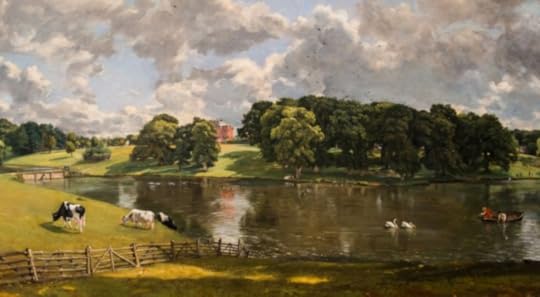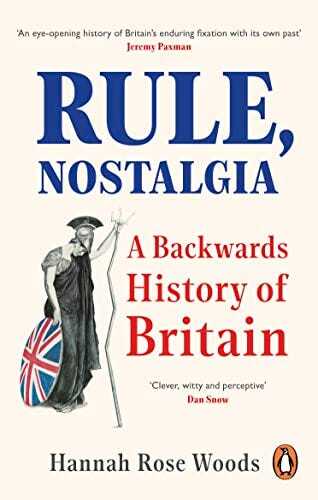Elogio della nostalgia. In praise of nostalgia
 “Wivenhoe Park, Essex” by John Constable, 1816
“Wivenhoe Park, Essex” by John Constable, 1816 Il Libro
Il Libro
“La gente guarda sempre indietro con nostalgia, dimenticando che le persone a cui guardano avevano fatto la medesima cosa”.
Sì, è vero, anche a me è venuta una sensazione di nostalgia leggendo la recensione di un libro appena uscito in lingua inglese di cui vedete la copertina. L’articolo è apparso sulla prestigiosa rivista letteraria TLS con la riproduzione del dipinto di John Constable. L’accattivante titolo mi ha subito colpito: “L’erba era più verde. La nostalgia è quella di una volta?”
Strana parola la nostalgia. Noi la pronunziamo con l’accento sulla i, gli inglesi l’hanno acquisita nel loro dizionario e la pronunziano con l’accento sulla a. Il messaggio principale di “Rule, Nostalgia” è che l’idea del passato sia un posto migliore, un fatto che ha alimentato l’ascesa del populismo. La nostalgia sembra essere sempre con noi.
Il libro esplora come l’età dell’oro, illusoria e controversa, abbia perseguitato la Gran Bretagna sin dal medioevo e come possa liberarsi dalla sua dipendenza dal passato. L’autrice separa la storia dalla fantasia e fa risalire alle sue origini i potenti miti e le straordinarie storie che hanno plasmato la cultura britannica. Il libro è un trionfale viaggio all’indietro attraverso la storia del rapporto della Gran Bretagna con il proprio passato, una cronaca del loro stato di perenne nostalgia per un paradiso appena perduto.
Non ho ancora letto il libro, ma dai diversi estratti e dalle molte recensioni mi sono fatto la mia personale idea per quanto concerne questa fatidica parola e quello che mi lega a questo Paese. Hannah Rose Woods viaggia all’indietro nel suo libro per circa cinquecento anni. Il mio viaggio è molto più breve rispetto al suo, il sottotitolo del libro è “500 anni di nostalgia dei bei vecchi tempi”. Woods racconta la storia a ritroso, cominciando dal presente prossimo.
Il primo capitolo, “Keep Calm And Take Back Control”, tira i fili delle bizzarre paranoie della Gran Bretagna post-Brexit sull’Europa fino a raggiungere la prima vittoria elettorale di Margaret Thatcher nel 1979. L’ultimo capitolo torna dalla Gloriosa Rivoluzione del 1688 al XVI secolo, sfumando sullo spettacolo del pubblico teatrale che si dilettava nell’Enrico V di Shakespeare, a sua volta una resa nostalgica della battaglia di Agincourt nel 1415.
Dopo un viaggio in treno durato 45 ore, sbarcai su questa isola in un umido e piovoso pomeriggio a Dover nel mese di ottobre del 1961. Studente lavoratore, con tanta voglia di apprendere la lingua. A distanza di oltre mezzo secolo, dopo tanti viaggi, esperienze e conoscenze, mi scopro nostalgico rincorrendo i pensieri nostalgici della Woods. Difficile e complicato fare l’elenco dei ricordi e delle memorie che da quello sbarco si sono poi succeduti per circa settanta anni. Non mi resta che leggere la parola nostalgia a modo mio.
La nostalgia può influenzare la nostra percezione del passato in vari modi. E’ una sensazione sentimentale di ricordi per il passato che può ridurre la percezione del dolore e stimolare le proprie emozioni. Non è solo un’esperienza orientata al passato, ma può anche essere orientata al futuro. Motiva stati affettivi, comportamenti e obiettivi che migliorano la vita futura delle persone.
Può migliorare il benessere ed è innescata da stati affettivi negativi come tristezza, solitudine e mancanza di significato del vivere. Tuttavia, è stato rilevato che la nostalgia non ha alcun effetto significativo sulla percezione del tempo. Nel complesso, può influenzare la nostra percezione del passato e del futuro e può avere effetti sia positivi che negativi sul nostro benessere.
Non è solo un’esperienza orientata al passato, ma può anche essere orientata al futuro. Gli stati affettivi negativi come la tristezza, la solitudine e l’insensatezza innescano la nostalgia e questa, a sua volta, aumenta il benessere. Comporta la riflessione sulle esperienze passate, ma motiva stati affettivi, comportamenti e obiettivi che migliorano la vita futura delle persone. Le persone possono fare riferimento al loro passato nostalgico per ricordare a se stessi cosa si prova ad essere giovani e amati.
La nostalgia può aumentare l’ottimismo e le intenzioni di stare insieme. Pertanto è un’esperienza emotiva complessa che può essere sia passata che orientata al futuro. Può migliorare il benessere in vari modi se è vissuta come un’emozione straordinariamente positiva che migliora l’umore e aumenta il senso della vita. Può ridurre la percezione del dolore e fornire uno scorcio del proprio sé autentico. Può anche innescare ispirazione e motivazione e aiutare nella risoluzione dei problemi.
La nostalgia mobilita il sé, in particolare il sé sociale, e aumenta l’ottimismo, la connessione e l’autostima. Può anche aumentare il perseguimento di obiettivi sociali e fornire conforto psicologico. Per gli individui ad alto contenuto di nostalgia, questo sentimento indotto aumenta l’ottimismo attraverso la connessione e l’autostima. In sintesi, la nostalgia può migliorare il benessere fornendo conforto psicologico, aumentando la connessione sociale e l’autostima.
@@@@@@@@@@@@@@@@@@@@@@@@@@@@@@@@@@@@@@
“People have always looked back with longing; forgetting, in turn, that the people they looked back to were doing the same”.
Yes, it’s true, I too had a feeling of nostalgia reading the review of a book that just came out in English whose cover you see above. The article appeared in the prestigious literary magazine TLS with the reproduction of the painting by John Constable. The catchy title immediately struck me: “The grass was greener. Is nostalgia what it used to be?”
Nostalgia is a strange word. We pronounce it with the accent on the i, the English have acquired it in their dictionary and pronounce it with the accent on the a. The main message of “Rule, Nostalgia” is that the idea that the past was a better place fueled the rise of populism and that nostalgia is always with us.
The book explores how the illusory and controversial Golden Age has haunted Britain since medieval times and how it can break free from its dependence on the past. The author separates history from fantasy and traces its origins to the powerful myths and extraordinary stories that have shaped British culture. The book is a triumphal journey back through the history of Britain’s relationship with its past, a chronicle of their state of perpetual nostalgia for a paradise just lost.
I haven’t read the book yet, but from the various excerpts and many reviews I got my own personal idea about this word and what binds me to this country. Hannah Rose Woods travels backwards in her book about five hundred years. My journey is much shorter than hers, the subtitle of the book is “500 years of nostalgia for the good old days”. Woods tells the story backwards, starting with the near present.
The first chapter, ‘Keep Calm And Take Back Control’, pulls the strings of post-Brexit Britain’s bizarre paranoia about Europe all the way to Margaret Thatcher’s first election victory in 1979. The last chapter returns from the Glorious Revolution of 1688 to the 16th century, fading into the spectacle of theater audiences reveling in Shakespeare’s Henry V, itself a nostalgic rendering of the Battle of Agincourt in 1415. After a 45-hour train journey, I landed on this island in a humid and rainy afternoon in Dover in October 1961. Working student, with a great desire to learn the language.
More than half a century later, after so many travels, experiences and acquaintances, I find myself nostalgic chasing Woods’ nostalgic thoughts. It is difficult to make a list of recollections and remembrances that followed one another for about seventy years from that landing. I just have to read the word nostalgia in my own way.
Nostalgia is a common human experience that can have psychological benefits, such as counteracting loneliness and boredom12. However, it can also be painful, as waiting and forgetting can be3. Looking back at the past can provide perspective, but it is important to remember that the past is often romanticized and may not have been as idyllic as it is remembered1.
Nostalgia can affect our perception of the past in various ways. Nostalgia is a sentimental feeling of longing for the past, and it can reduce pain perception. It can also stimulate emotions and brand perception. Nostalgia is not just a past-oriented experience, but it can also be future-oriented. It motivates affective states, behaviors, and goals that improve people’s future lives.
Nostalgia can enhance well-being, and it is triggered by negative affective states such as sadness, loneliness, and meaninglessness. However, a study found that nostalgia has no significant effect on time perception. Overall, nostalgia can influence our perception of the past and the future, and it can have both positive and negative effects on our well-being.
Nostalgia is not just a past-oriented experience, but it can also be future-oriented. Negative affective states such as sadness, loneliness, and meaninglessness trigger nostalgia, and nostalgia, in turn, enhances well-being. Nostalgia involves reflecting on past experiences, but it motivates affective states, behaviors, and goals that improve people’s future lives.
People can reference their nostalgic past to remind themselves what it felt to be young and loved. Nostalgia can increase optimism and intentions to stay together. Therefore, nostalgia is a complex emotional experience that can be both past and future-oriented. Nostalgia can enhance well-being in various ways. Nostalgia is experienced as an overwhelmingly positive emotion that boosts one’s mood and increases a sense of meaning in life.
Nostalgia can reduce the perception of pain and provide a glimpse of one’s authentic self. It can also trigger inspiration and motivation and help with problem-solving. Nostalgia mobilizes the self, particularly the social self, and increases optimism, social-connectedness, and self-esteem.
Nostalgia can also increase social goal pursuit and provide psychological comfort.
For individuals high in trait nostalgia, induced nostalgia increases optimism via social-connectedness and self-esteem. In summary, nostalgia can enhance well-being by providing psychological comfort, increasing social-connectedness, and self-esteem, and mobilizing the self to pursue social goals and increase optimism.[image error]
Published on April 14, 2023 12:39
No comments have been added yet.
MEDIUM
Nessuno è stato mai me. Può darsi che io sia il primo. Nobody has been me before. Maybe I’m the first one.
- Antonio Gallo's profile
- 52 followers



